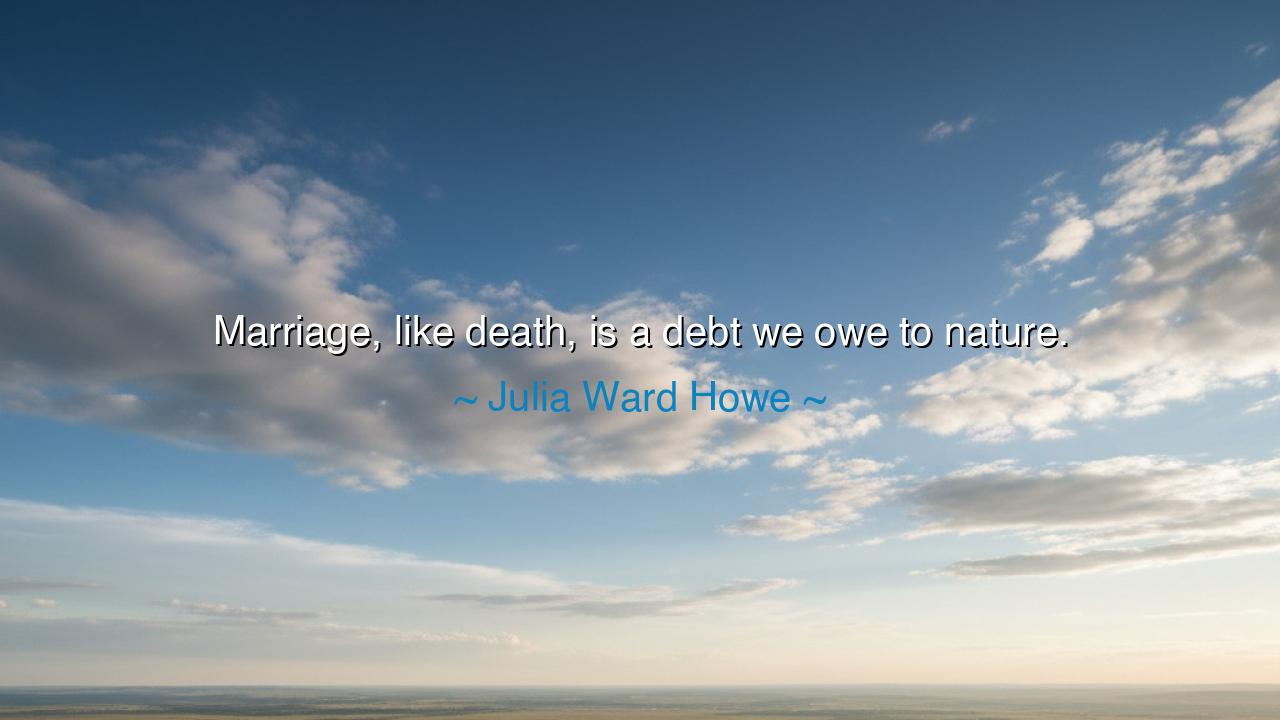
Marriage, like death, is a debt we owe to nature.






"Marriage, like death, is a debt we owe to nature." These words of Julia Ward Howe echo across the ages, carrying with them the weight of an ancient truth—one that speaks to the deep, sometimes unsettling, nature of life itself. In saying that marriage is a debt we owe to nature, Howe calls us to recognize that it is not merely a choice or a personal longing, but a natural obligation, woven into the very fabric of human existence. Like death, it is inevitable, a part of the cycle of life that we cannot avoid, nor should we wish to. It is the commitment that binds us to the continuity of the human story, just as death binds us to the end of our own individual journey.
Let us imagine the lives of the ancient Greeks, who revered marriage as a sacred and necessary bond. Plato spoke of marriage as a means of sustaining the state, of ensuring that society continued through generations. It was not simply about personal happiness or companionship; it was about the future of humanity, the continuity of life. The Greeks, like many ancient cultures, viewed marriage as a debt owed to the community and to the divine order of nature itself. To refuse this debt was to deny one’s responsibility to the family, to the community, and to the very structure of life. In the eyes of the ancients, marriage was an integral part of fulfilling the natural laws that governed existence.
Howe’s words find their roots in this ancient wisdom. Just as death is a debt we must all pay, marriage is a debt we must fulfill to ensure the survival of the species. It is a union not just of two souls, but of generations, a bond that transcends the individual and connects us to the very fabric of life itself. Just as the trees give of their fruits to nourish the earth, so too do marriage and family nourish society by ensuring the next generation is born, raised, and guided into the future.
In more recent times, consider the example of Queen Victoria of England, whose marriage to Prince Albert was more than a union of love; it was a fulfillment of a duty to the crown and the people. Their union not only produced heirs who would carry on the legacy of the British monarchy, but it also cemented the dynasty that would influence the fate of nations. While the love between Victoria and Albert was genuine, their marriage was also a debt owed to the very order of society—an obligation that ensured the continuity of the royal line. Through their marriage, they fulfilled the natural law of reproduction and inheritance, allowing the empire to thrive.
And so, we come to the heart of Howe’s insight. Marriage is not merely a personal choice, but a covenant with nature, a recognition of our place in the larger cycle of life. We are born, we grow, we love, and we pass on what we have learned, what we have created, to the next generation. In this way, marriage becomes not just a bond between two people, but a sacred obligation to the future. It is a debt we owe to the natural order, a debt we can never escape, and a debt we should not seek to avoid.
The lesson here is clear. To view marriage as a mere social contract, or as something to be entered into only for personal fulfillment, is to miss its deeper significance. Like death, marriage is a natural responsibility, a part of the continuum of life that links us to the generations before and after us. It is a debt we must honor—not out of obligation alone, but out of reverence for the cycles of nature that sustain us all.
Let us, then, approach marriage with a sense of purpose and responsibility. It is not just about what we gain, but what we give—our commitment to the future, to life, and to the greater good. And in fulfilling this debt, let us remember that the natural order is not a force to be resisted, but a guide to help us navigate our journey. In honoring the union of marriage, we honor the natural world, the continuity of life, and the legacy we leave for those who come after us.






AAdministratorAdministrator
Welcome, honored guests. Please leave a comment, we will respond soon